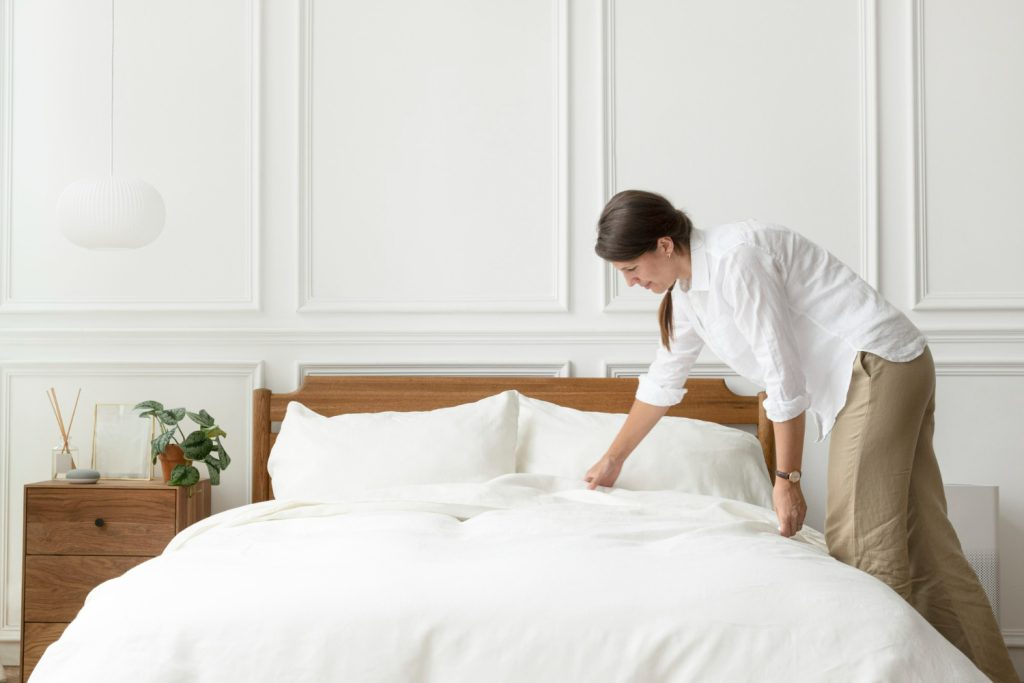
Image by Freepik
Common sense tells us, you need 7-8 hours of sleep to rejuvenate your body for the following day. You followed the same routine last night out of habit and slept for eight hours. Yet this morning, instead of feeling revived, you end up waking up tired after 8 hours of sleep, wake up exhausted and miserable—the exact reverse of what you usually anticipate.
So, the most apparent explanation of why you could feel that way in the morning is that you didn’t receive “high-quality” sleep. Obtaining good quality of sleep is surely not as easy as spending 7 to 8 hours in bed. There’s a possibility that you could still have bad sleep even though you checked in for the appropriate amount of hours.
Reason For Waking Up Tired After 8 Hours Of Sleep

Image by Freepik
If you are suffering from sleep problem like this, you can guess simply the reasons are:
- Medical Disorders
- Thyroid Disorder : You may be experiencing weariness, which may be one reason you wake up exhausted. You could also feel depressed, gain weight, or have discomfort in your muscles and joints.
- Adrenal Fatigue : It is brought on by a hormonal imbalance that leads your body to expel too much cortisol and adrenaline.
- Chronic Fatigue Syndrome : A disorder comparable to adrenal exhaustion is chronic fatigue syndrome, which affects more women than males.
- Depression : Feeling worn out and wake up exhausted is one of the most typical symptoms of depression.
- Anemia : No matter how much sleep you get at night, having low amounts of iron in your blood might make you feel exhausted.
Here are several reasons you’re waking up tired after 8 hours of sleep—and some easy methods to prevent it.
1. You Don’t Sleep In A Good Position
No matter how many hours you sleep, if you sleep in a terrible or unusual posture, you are probably more likely to be cranky the following day. It may be detrimental to your body’s capacity to operate and recover to lie in an unusual or extended laying posture for many hours while you sleep. What’s more, it can leave you with discomfort in certain areas of your body when you wake up.
For instance, if you spend the whole night sleeping on your side without moving, your hip and lower back may flex significantly. Apart from that, sleeping on your arm for an extended period of time might interrupt blood flow and nerve function, leading to the feared “dead arm” and finger numbness.
How to Fix it?
Even if it’s not connected to a sleep problem, it affects your physical abilities, you should break bad habit.
If you prefer to sleep on your side, it’s a good idea to lay a cushion under the knee of the “top” leg or between your knees to prevent hip pain and preserve normal hip alignment. If you sleep on your arm, consider putting a cushion on your neck, but make sure that your head isn’t pushed up too high on pillows.
2. It May Be Time To Get A New Pillow
That enormous, extra-soft, fluffy pillow can seem ideal, but sometimes it might cause you to feel torture rather than comfort. The fact is that having your head too high when laying down causes your spine to become misaligned and you will end up waking up tired after 8 hours of sleep. Too much pillow elevation is equivalent to having your neck hunched over for eight hours throughout the day. It makes sense why you have excruciating neck discomfort in the morning.
How to Fix it?
It is advised that you use an adjustable pillow that supports your neck the best but doesn’t lift your head excessively so that you can preserve the natural straight posture of your spine.
3. Using Gadgets Just Before Going To Bed
Okay, so this may be the easiest one to break bad habit. But, bear in mind that since your brain links light with daylight, the artificial blue light emitted by your smartphone, tablet, laptop, television, e-reader, portable gaming console, or other similar gadgets mislead your brain into thinking it needs to remain awake.
The sleep-inducing hormone melatonin, which regulates your sleep and waking cycles, is suppressed by this blue light. Your circadian cycle may be disrupted by this impact, which might result in restless nights and fatigue throughout the day.
How to Fix it?
Make sure to avoid using any gadgets, 90 minutes before going to bed. Even if it appears challenging, doing it will help you get the most out of your eight hours of sleep.
4. During Night, You Subconsciously Clench Or Grind Your Teeth
Sleep bruxism is most likely to blame if you awaken in the morning with a stiff jaw or a dull headache. A person who suffers from sleep bruxism unintentionally grinds, gnashes, or clenches his teeth during the night. This issue is often brought on by excessive tension, which prevents you from letting your jaw and cheek muscles relax while you sleep.
How to Fix it?
Avoid drinking soda, coffee, or energy drinks, and limit your intake of chocolate throughout the day. Coffee is a stimulant, therefore it will be more difficult for you to unwind at night and relax your head and jaw muscles.
It’s also a good idea to unwind before bed. Reduce your stress levels before going to bed so that you may sleep more soundly and avoid grinding your teeth. To assist break bad habit, try massaging the muscles in your neck, shoulders, and face before night. You may also try using a warm, moist towel on the jaw region directly before bed.
Consider seeing your dentist for a mouth guard if this issue continues so that it prevents your teeth from wearing down.
5. Alcohol Before Bed
Alcohol first gives off the impression that it has a calming effect since it makes it simpler to fall asleep. Yet, alcohol is a depressive and will actually make it harder for you to get a good quality of sleep. In reality, it interferes with your regular sleep cycle, causing you to have less restful, shallower sleep—a form of sleep that is not restorative.
How to Fix it?
Of course, the odd drink won’t harm you, but if you truly want to get a good quality of sleep, try to limit your alcohol consumption to one per night and consume it at least three to four hours before bed.
6. Sleep Apnea
A sleep problem called sleep apnea occurs when breathing regularly stops and resumes while you’re asleep. This ailment may be the reason you wake up in the middle of the night gasping for air or snoring loudly, or if you consistently feel exhausted even after a full night’s sleep.
Blockage of the upper respiratory airways, which prevents you from taking a deep breath, is the cause of sleep apnea. As your airway closes, your blood’s oxygen level drops, warning your brain to wake up and reopen your airway. This “waking” normally lasts so briefly that you don’t recall it, but every time it occurs, you make a snorting, choking, or gasping noise. Depending on the severity of the apnea, this rhythm may repeat itself five to thirty times or more per hour.
Your body and mind don’t receive the rest they need to operate when you are repeatedly awakened during the night, so you wake up exhausted and depleted.
How to Fix it?
Before doing anything else, acquire a correct diagnosis for your illness by seeing a doctor. If you are found to have minor sleep apnea, it is often treatable with weight reduction and avoiding alcohol before bed. If your condition is moderate to severe, you’ll need to use a CPAP machine or comparable equipment that employs positive airway pressure to assist with breathing.
Other Ways You Can Fix Your Sleep Problems and Wake Up Refreshed

Image by Freepik
1. Put A Caffeine Curfew In Place
Yeah, you have heard it before, but few of us are more knowledgeable on the subject than the cliched bro-science advice to “don’t drink coffee late.”
The half-life of caffeine is between 5 and 8 hours. This indicates that consuming a double shot of espresso 5-8 hours before bed will have an influence on your ability to sleep similar to consuming a single dose just before bed. Avoid using caffeine as a source of energy, consume less of it, and if you find it difficult to break bad habit, indulge in your vice in the morning.
2. Improve Your Digestion
They appropriately dubbed the stomach “the second brain” after learning that it has the same amount of neurotransmitters as the brain. What relation does this have to sleep?
Melatonin, a hormone that controls the cycles of sleep and wakefulness, is one of the key players in the game of having a good quality of sleep. Serotonin, which makes up 95% of our serotonin, is the precursor of melatonin. The intestines create it there. Therefore healthy levels of serotonin result from healthy intestines and digestion.
3. Consume More Foods That Promote Sleep
- Chicken, eggs, turkey, chia/hemp/pumpkin seeds, almonds, bananas, and eating more leafy greens all contain tryptophan.
- Magnesium (eating more leafy greens, nuts, seeds, seafood, beans, dark chocolate, bananas, avocados, healthy grains)
- Selenium (beef, poultry, sunflower seeds, oysters)
- C vitamin (eating more leafy greens, citrus fruits, kiwi, strawberries, bell peppers)
- Potassium (eating more leafy greens, bananas, potatoes, broccoli, avocados, sesame seeds, sardines, collard and mustard greens and kale)
- Nutrition D (apart from sunlight, you can get this precious vitamin in food form by eating salmon, mackerel, tuna, shiitake mushrooms and oysters)
- Omega 3’s (chia, pumpkin, hemp and flax seeds, salmon, halibut, walnuts and cold-processed oils like krill, olive or flax)
4. Consider Additional Aspects
Your ability to fall asleep may be significantly impacted by stress, children, drugs or alcohol, sleep apnea, insomnia, and other problems. Your energy, attitude, happiness, and productivity are all impacted by all of those factors. For these types of problems, get assistance. There are professionals that work on these topics since home cures and procedures can’t repair everything.
5. Herbal Tea
Eliminating caffeine from your diet is a smart suggestion if you often wake up exhausted. However, this does not imply that you must completely give up warm beverages. Just substitute herbal teas for your nightly cup of coffee to enjoy. If you have trouble falling asleep, chamomile tea is an excellent solution since it has long been utilized for its calming effects. If you like something with a refreshing flavour, you may perhaps choose a cup of peppermint tea.
6. Keep Hydrated
Feelings of exhaustion may be considerably exacerbated by dehydration. Make sure you consume eight or more full glasses of water every day. Also, you should drink extra to stay hydrated if you have an active lifestyle, are pregnant, or are breastfeeding. Having a glass of water next to your bed so you may sip on it while you sleep is also a fantastic idea.
7. Set a Smart Alarm
Several various clock types need more than simply the push of a button to turn off. They’ll often wake you up immediately away, regardless of whether you need to first solve a problem or use the restroom to snap a photo. You can try the Free Alarmy app and you will find your morning routine getting a lot better.
Does Lack Of Sleep Stunt Growth?

Image by Freepik
It may be. Lack of sleep for one night won’t stop you from growing. But, a person’s development may be hampered over time if they don’t get enough sleep. While growth hormone is often produced when you sleep, this is. Growth hormone is inhibited when someone habitually receives little sleep, a condition known as “sleep deprivation.”
After a few days of getting used to your new routine, you will probably be able to wake up most of the time without a clock. You may need to change your sleep schedule and add a half-hour if you often oversleep.
If you are frequently waking up tired after 8 hours of sleep, try those methods and make your day positive.
11 Ways to Wake up Early and Happy in the morning



